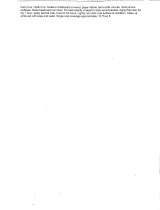Page is loading ...

Use and Care Manual
Ultra Durex™ DE-3320, 3322, 3325
Int/Ext Acrylic Waterborne DTM High Gloss Enamel
Surface Preparation
All surfaces must be dry, clean, sound and free of contaminants. Remove all dirt,
grease, chalk, mildew, oil, rust, concrete curing agents, chalk, dust, and other soluble
contaminants from steel surfaces by washing with solvent, vapor, cleaning
compound or other method.
Remove all loose mill scale, loose rust, loose paint, and other loose detrimental
foreign matter by hand chipping, scraping, sanding, and wire brushing or by power
wire brushing, power sanding, power grinding, power tool chipping, and power tool
descaling.
Prime if required as per recommended specifications of this product for surfaces
like: concrete, plasters, gypsum wallboard, drywall, wood, plywood, steel,
aluminum, galvanized steel, other composition materials or vinyl siding with the
recommended Lanco® primer or primer/sealer, following application instructions.
Glossy surfaces should be lightly sanded and primed previous to new paint
application.
Recommended Paint Systems
Iron and Steel:
Surface preparation: SSPC-SP2 / SP3
Primer, apply 1 coat : Oil-Red Oxide Primer
Paint, apply 2 coats: Ultra Durex™
Galvanized Metal and Aluminum:
Surface preparation: SSPC-SP1
Primer, apply 1 coat : Oil-White Galvanized
Paint, apply 2 coats: Ultra Durex™
Masonry and Concrete:
Surface preparation: SSPC-SP13
Primer, apply 1 coat : Stain Killer™ Primer
Paint, apply 2 coats: Ultra Durex™
Wood:
Surface preparation: Dry and Clean
Primer, apply 1 coat : Stain Killer™ Primer
Paint, apply 2 coats: Ultra Durex™

Use and Care Manual
Surface Preparation Standards
SSPC-SP1 Solvent Cleaning
Removal of all visible oil, grease, soil, drawing and cutting compounds, and other
soluble contaminants from steel surfaces with solvent LANCO® Lacquer Thinner
LT-102, vapor cleaning, alkali, emulsifying agent, or steam.
SSPC-SP2 Hand Tool Cleaning
Removes all loose mill scale, loose rust, loose paint, and other loose foreign matter
by hand chipping, scraping, sanding, and wire brushing.
SSPC-SP3 Power Tool Cleaning
Removes all loose mill scale, loose rust, loose paint, and other loose detrimental
foreign matter by power wire brushing, power sanding, power grinding, power tool
chipping, and power tool descaling.
SSPC-SP7 Brush-Off Blast Cleaning
When viewed without magnification, the surface shall be free of all visible oil,
grease, dirt, dust, loose mill scale, loose rust, and loose coating. Tightly adherent
mill scale, rust, and coating may remain on the surface. Mill scale, rust, and coating
are considered tightly adherent if they cannot be removed by lifting with a dull
putty knife.
SSPC-SP13 / NACE 6 Surface Preparation of Concrete
Provides requirements for surface preparation of concrete by mechanical, chemical,
or thermal methods prior to the application of bonded protective coating or lining
systems.
Surface Application Recommendations
Previously Painted Surfaces: Clean surface of all loose, peeling paint and foreign
material; spot prime bare metal areas. If the paint is old, peeling or badly weathered,
hand tool clean (SSPC-SP2) or power tool clean (SSPC-SP3). Glossy or Smooth
surfaces should be sanded. If poor adhesion of existing coatings is noted or coating
is loosed by blistering, rupture or scratching, additional abrasion or removal
methods may be necessary to provide a clean and sound surface.
New Iron and Steel Metals: Clean surface of all loose rust, grease, oil, and foreign
material; spot prime bare metal. If the paint is old, peeling or badly weathered, hand
tool clean (SSPC-SP2) or power tool clean (SSPC-SP3).
New Galvanized Metal: Allow to weather a minimum of six months prior to coating.
Solvent clean as per SSPS-SP1 standard, then prime as required. When weathering is
not possible, solvent clean as per SSPS-SP1 and apply a test patch, prime as
required. Allow primer to dry one week before testing for adhesion. If adhesion is
poor, brush blast is recommended to remove this treatment. Remove silicate or
white rust by sanding (SSPC-SP7). Water-soluble contaminants should be rinsed off
with water.

Use and Care Manual
New Aluminum: New surfaces must be free of oils and lubricants often used in the
fabrication or machining of aluminum. Use solvent cleaning preparation SSPC-SP1
with LANCO® Lacquer Thinner LT-102 to clean and remove any foreign matter that
could affect the performance of the coating. This can also be accomplished on
exterior products by weathering for a month to six weeks prior to the application of
primer. Surface must be clean and free of contaminants. If detergent is used, be
sure to rinse well, and allow to dry before paint. If small thin oxide film is found on
surface, remove by hand cleaning SSPC-SP2 or power cleaning SSPC-SP3.
Masonry and Concrete Surfaces: New mortar plaster, stucco and concrete block
must be cured prior to application. Remove any surface contaminant, form release,
curing agents or efflorescence, surface must have a safe pH level under 9 prior to the
application of paint or primer. Surface preparation of concrete by mechanical,
chemical, or thermal methods as of SSPC-SP13 prior to the application of bonded
protective coating or lining systems may be necessary. Prime with Lanco® Maxima
HP Primer MA-3305 or Lanco® Stain Killer Primer WP-039.
Wood and Plywood: Sand rough areas and prime properly prepared surface with
Lanco® Stain Killer™ Primer WP-039. Maximum acceptable moisture content prior
to coating new wood should be under 16%.
/


